- Home
- Wilkie Collins
Man and Wife Page 37
Man and Wife Read online
Page 37
of mind, and the happiness of a person very dear to her, were
concerned alike in the opinion which Mr. Camp might give when he
had been placed in possession of the facts.
She then proceeded to state the facts, without mentioning names:
relating in every particular precisely the same succession of
events which Geoffrey Delamayn had already related to Sir Patrick
Lundie--with this one difference, that she acknowledged herself
to be the woman who was personally concerned in knowing whether,
by Scottish law, she was now held to be a married woman or not.
Mr. Camp's opinion given upon this, after certain questions had
been asked and answered, differed from Sir Patrick's opinion, as
given at Windygates. He too quoted the language used by the
eminent judge--Lord Deas--but he drew an inference of his own
from it. "In Scotland, consent makes marriage," he said; "and
consent may be proved by inference. I see a plain inference of
matrimonial consent in the circumstances which you have related
to me and I say you are a married woman."
The effect produced on the lady, when sentence was pronounced on
her in those terms, was so distressing that Mr. Camp sent a
message up stairs to his wife; and Mrs. Camp appeared in her
husband's private room, in business hours, for the first time in
her life. When Mrs. Camp's services had in some degree restored
the lady to herself, Mr. Camp followed with a word of
professional comfort. He, like Sir Patrick, acknowledged the
scandalous divergence of opinions produced by the confusion and
uncertainty of the marriage-law of Scotland. He, like Sir
Patrick, declared it to be quite possible that another lawyer
might arrive at another conclusion. "Go," he said, giving her his
card, with a line of writing on it, "to my colleague, Mr. Crum;
and say I sent you."
The lady gratefully thanked Mr. Camp and his wife, and went next
to the office of Mr. Crum.
Mr. Crum was the older lawyer of the two, and the harder lawyer
of the two; but he, too, felt the influence which the charm that
there was in this woman exercised, more or less, over every man
who came in contact with her. He listened with a patience which
was rare with him: he put his questions with a gentleness which
was rarer still; and when _he_ was in possession of the
circumstances---behold, _his_ opinion flatly contradicted the
opinion of Mr. Camp!
"No marriage, ma'am," he said, positively. "Evidence in favor of
perhaps establishing a marriage, if you propose to claim the man.
But that, as I understand it, is exactly what you don't wish to
do."
The relief to the lady, on hearing this, almost overpowered her.
For some minutes she was unable to speak. Mr. Crum did, what he
had never done yet in all his experience as a lawyer. He patted a
client on the shoulder, and, more extraordinary still , he gave a
client permission to waste his time. "Wait, and compose
yourself," said Mr. Crum--administering the law of humanity. The
lady composed herself. "I must ask you some questions, ma'am,"
said Mr. Crum--administering the law of the land. The lady bowed,
and waited for him to begin.
"I know, thus far, that you decline to claim the gentleman," said
Mr. Cram. "I want to know now whether the gentleman is likely to
claim _you._"
The answer to this was given in the most positive terms. The
gentleman was not even aware of the position in which he stood.
And, more yet, he was engaged to be married to the dearest friend
whom the lady had in the world.
Mr. Crum opened his eyes--considered--and put another question as
delicately as he could. "Would it be painful to you to tell me
how the gentleman came to occupy the awkward position in which he
stands now?"
The lady acknowledged that it would be indescribably painful to
her to answer that question.
Mr. Crum offered a suggestion under the form of an inquiry:
"Would it be painful to you to reveal the circumstances--in the
interests of the gentleman's future prospects--to some discreet
person (a legal person would be best) who is not, what I am, a
stranger to you both?"
The lady declared herself willing to make any sacrifice, on those
conditions--no matter how painful it might be--for her friend's
sake.
Mr. Crum considered a little longer, and then delivered his word
of advice:
"At the present stage of the affair," he said, "I need only tell
you what is the first step that you ought to take under the
circumstances. Inform the gentleman at once--either by word of
mouth or by writing--of the position in which he stands: and
authorize him to place the case in the hands of a person known to
you both, who is competent to decide on what you are to do next.
Do I understand that you know of such a person so qualified?"
The lady answered that she knew of such a person.
Mr. Crum asked if a day had been fixed for the gentleman's
marriage.
The lady answered that she had made this inquiry herself on the
last occasion when she had seen the gentleman's betrothed wife.
The marriage was to take place, on a day to be hereafter chosen,
at the end of the autumn.
"That," said Mr. Crum, "is a fortunate circumstance. You have
time before you. Time is, here, of very great importance. Be
careful not to waste it."
The lady said she would return to her hotel and write by that
night's post, to warn the gentleman of the position in which he
stood, and to authorize him to refer the matter to a competent
and trust-worthy friend known to them both.
On rising to leave the room she was seized with giddiness, and
with some sudden pang of pain, which turned her deadly pale and
forced her to drop back into her chair. Mr. Crum had no wife; but
he possessed a housekeeper--and he offered to send for her. The
lady made a sign in the negative. She drank a little water, and
conquered the pain. "I am sorry to have alarmed you," she said.
"It's nothing--I am better now." Mr. Crum gave her his arm, and
put her into the cab. She looked so pale and faint that he
proposed sending his housekeeper with her. No: it was only five
minutes' drive to the hotel. The lady thanked him--and went her
way back by herself.
"The letter!" she said, when she was alone. "If I can only live
long enough to write the letter!"
CHAPTER THE THIRTIETH.
ANNE IN THE NEWSPAPERS.
MRS. KARNEGIE was a woman of feeble intelligence and violent
temper; prompt to take offense, and not, for the most part, easy
to appease. But Mrs. Karnegie being--as we all are in our various
degrees--a compound of many opposite qualities, possessed a
character with more than one side to it, and had her human merits
as well as her human faults. Seeds of sound good feeling were
scattered away in the remoter corners of her nature, and only
waited for the fertilizing occasion that was to help them to
sp
ring up. The occasion exerted that benign influence when the
cab brought Mr. Crum's client back to the hotel. The face of the
weary, heart-sick woman, as she slowly crossed the hall, roused
all that was heartiest and best in Mrs. Karnegie's nature, and
said to her, as if in words, "Jealous of this broken creature?
Oh, wife and mother is there no appeal to your common womanhood
_here?_"
"I am afraid you have overtired yourself, ma'am. Let me send you
something up stairs?"
"Send me pen, ink, and paper," was the answer. "I must write a
letter. I must do it at once."
It was useless to remonstrate with her. She was ready to accept
any thing proposed, provided the writing materials were supplied
first. Mrs. Karnegie sent them up, and then compounded a certain
mixture of eggs and hot wine. for which The Sheep's Head was
famous, with her own hands. In five minutes or so it was
ready--and Miss Karnegie was dispatched by her mother (who had
other business on hand at the time) to take it up stairs.
After the lapse of a few moments a cry of alarm was heard from
the upper landing. Mrs. Karnegie recognized her daughter's voice,
and hastened to the bedroom floor.
"Oh, mamma! Look at her! look at her!"
The letter was on the table with the first lines written. The
woman was on the sofa with her handkerchief twisted between her
set teeth, and her tortured face terrible to look at. Mrs.
Karnegie raised her a little, examined her closely--then suddenly
changed color, and sent her daughter out of the room with
directions to dispatch a messenger instantly for medical help.
Left alone with the sufferer, Mrs. Karnegie carried her to her
bed. As she was laid down her left hand fell helpless over the
side of the bed. Mrs. Karnegie suddenly checked the word of
sympathy as it rose to her lips--suddenly lifted the hand, and
looked, with a momentary sternness of scrutiny, at the third
finger. There was a ring on it. Mrs. Karnegie's face softened on
the instant: the word of pity that had been suspended the moment
before passed her lips freely now. "Poor soul!" said the
respectable landlady, taking appearances for granted. "Where's
your husband, dear? Try and tell me."
The doctor made his appearance, and went up to the patient.
Time passed, and Mr. Karnegie and his daughter, carrying on the
business of the hotel, received a message from up stairs which
was ominous of something out of the common. The message gave the
name and address of an experienced nurse--with the doctor's
compliments, and would Mr. Karnegie have the kindness to send for
her immediately.
The nurse was found and sent up stairs.
Time went on, and the business of the hotel went on, and it was
getting to be late in the evening, when Mrs. Karnegie appeared at
last in the parlor behind the bar. The landlady's face was grave,
the landlady's manner was subdued. "Very, very ill," was the only
reply she made to her daughter's inquiries. When she and her
husband were together, a little later, she told the news from up
stairs in greater detail. "A child born dead," said Mrs.
Karnegie, in gentler tones than were customary with her. "And the
mother dying, poor thing, so far as _I_ can see."
A little later the doctor came down. Dead? No.--Likely to live?
Impossible to say. The doctor returned twice in the course of the
night. Both times he had but one answer. "Wait till to-morrow."
The next day came. She rallied a little. Toward the afternoon she
began to speak. She expressed no surprise at seeing strangers by
her bedside: her mind wandered. She passed again into
insensibility. Then back to delirium once more. The doctor said,
"This may last for weeks. Or it may end suddenly in death. It's
time you did something toward finding her friends."
(Her friends! She had left the one friend she had forever!)
Mr. Camp was summoned to give his advice. The first thing he
asked for was the unfinished letter.
It was blotted, it was illegible in more places than one. With
pains and care they made out the address at the beginning, and
here and there some fragments of the lines that followed. It
began: "Dear Mr. Brinkworth." Then the writing got, little by
little, worse and worse. To the eyes of the strangers who looked
at it, it ran thus: "I should ill re quite * * * Blanche's
interests * * * For God's sake! * * * don't think of _me_ * * *"
There was a little more, but not so much as one word, in those
last lines, was legible
The names mentioned in the letter were reported by the doctor and
the nurse to be also the names on her lips when she spoke in her
wanderings. "Mr. Brinkworth" and "Blanche"--her mind ran
incessantly on those two persons. The one intelligible thing that
she mentioned in connection with them was the letter. She was
perpetually trying, trying, trying to take that unfinished letter
to the post; and she could never get there. Sometimes the post
was across the sea. Sometimes it was at the top of an
inaccessible mountain. Sometimes it was built in by prodigious
walls all round it. Sometimes a man stopped her cruelly at the
moment when she was close at the post, and forced her back
thousands of miles away from it. She once or twice mentioned this
visionary man by his name. They made it out to be "Geoffrey."
Finding no clew to her identity either in the letter that she had
tried to write or in the wild words that escaped her from time to
time, it was decided to search her luggage, and to look at the
clothes which she had worn when she arrived at the hotel.
Her black box sufficiently proclaimed itself as recently
purchased. On opening it the address of a Glasgow trunk-maker was
discovered inside. The linen was also new, and unmarked. The
receipted shop-bill was found with it. The tradesmen, sent for in
each case and questioned, referred to their books. It was proved
that the box and the linen had both been purchased on the day
when she appeared at the hotel.
Her black bag was opened next. A sum of between eighty and ninety
pounds in Bank of England notes; a few simple articles belonging
to the toilet; materials for needle-work; and a photographic
portrait of a young lady, inscribed, "To Anne, from Blanche,"
were found in the bag--but no letters, and nothing whatever that
could afford the slightest clew by which the owner could be
traced. The pocket in her dress was searched next. It contained a
purse, an empty card-case, and a new handkerchief unmarked.
Mr. Camp shook his head.
"A woman's luggage without any letters in it," he said, "suggests
to my mind a woman who has a motive of her own for keeping her
movements a secret. I suspect she has destroyed her letters, and
emptied her card-case, with that view." Mrs. Karnegie's report,
after examining the linen which the so-called "Mrs. Graham" had
worn when she arrived at the inn, proved the soundness of the
lawyer's o
pinion. In every case the marks had been cut out. Mrs.
Karnegie began to doubt whether the ring which she had seen on
the third finger of the lady's left hand had been placed there
with the sanction of the law.
There was but one chance left of discovering--or rather of
attempting to discover--her friends. Mr. Camp drew out an
advertisement to be inserted in the Glasgow newspapers. If those
newspapers happened to be seen by any member of her family, she
would, in all probability, be claimed. In the contrary event
there would be nothing for it but to wait for her recovery or her
death--with the money belonging to her sealed up, and deposited
in the landlord's strongbox.
The advertisement appeared. They waited for three days afterward,
and nothing came of it. No change of importance occurred, during
the same period, in the condition of the suffering woman. Mr.
Camp looked in, toward evening, and said, "We have done our best.
There is no help for it but to wait."
Far away in Perthshire that third evening was marked as a joyful
occasion at Windygates House. Blanche had consented at last to
listen to Arnold's entreaties, and had sanctioned the writing of
a letter to London to order her wedding-dress.
SIXTH SCENE.--SWANHAVEN LODGE.
CHAPTER THE THIRTY-FIRST
SEEDS OF THE FUTURE (FIRST SOWING).
"NOT SO large as Windygates. But--shall we say snug, Jones?"
"And comfortable, Smith. I quite agree with you."
Such was the judgment pronounced by the two choral gentlemen on
Julius Delamayn's house in Scotland. It was, as usual with Smith
and Jones, a sound judgment--as far as it went. Swanhaven Lodge
was not half the size of Windygates; but it had been inhabited
for two centuries when the foundations of Windygates were first
laid--and it possessed the advantages, without inheriting the
drawbacks, of its age. There is in an old house a friendly
adaptation to the human character, as there is in an old hat a
friendly adaptation to the human head. The visitor who left
Swanhaven quitted it with something like a sense of leaving home.
Among the few houses not our own which take a strong hold on our
sympathies this was one. The ornamental grounds were far inferior
in size and splendor to the grounds at Windygates. But the park
was beautiful--less carefully laid out, but also less monotonous
than an English park. The lake on the northern boundary of the
estate, famous for its breed of swans, was one of the curiosities
of the neighborhood; and the house had a history, associating it
with more than one celebrated Scottish name, which had been
written and illustrated by Julius Delamayn. Visitors to Swanhaven
Lodge were invariably presented with a copy of the volume
(privately printed). One in twenty read it. The rest were
"charmed," and looked at the pictures.
The day was the last day of August, and the occasion was the
garden-party given by Mr. and Mrs. Delamayn.
Smith and Jones--following, with the other guests at Windygates,
in Lady Lundie's train--exchanged their opinions on the merits of
the house, standing on a terrace at the back, near a flight of
steps which led down into the garden. They formed the van-guard
of the visitors, appearing by twos and threes from the reception
rooms, and all bent on going to see the swans before the
amusements of the day began. Julius Delamayn came out with the
first detachment, recruited Smith and Jones, and other wandering
bachelors, by the way, and set forth for the lake. An interval of
a minute or two passed--and the terrace remained empty. Then two
ladies--at the head of a second detachment of visitors--appeared
under the old stone porch which sheltered the entrance on that
side of the house. One of the ladies was a modest, pleasant
little person, very simply dressed. The other was of the tall and
formidable type of "fine women," clad in dazzling array. The

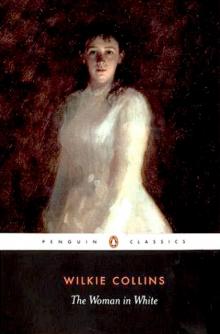 The Woman in White
The Woman in White The Queen of Hearts
The Queen of Hearts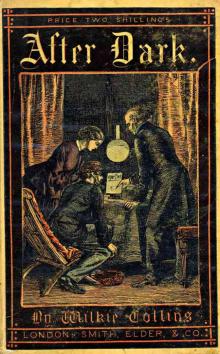 Miss Jeromette and the Clergyman
Miss Jeromette and the Clergyman Man and Wife
Man and Wife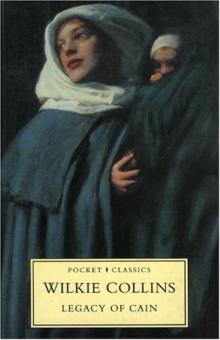 The Legacy of Cain
The Legacy of Cain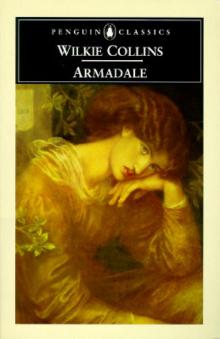 Armadale
Armadale The Frozen Deep
The Frozen Deep John Jago's Ghost or the Dead Alive
John Jago's Ghost or the Dead Alive Poor Miss Finch
Poor Miss Finch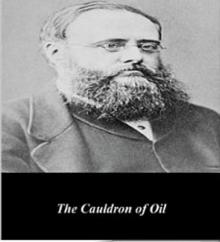 The Cauldron of Oil: A Case Worth Looking At
The Cauldron of Oil: A Case Worth Looking At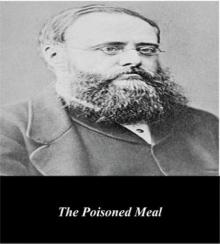 The Poisoned Meal
The Poisoned Meal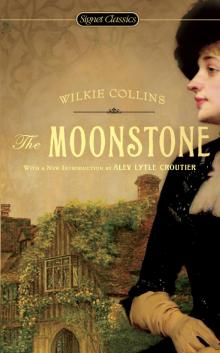 The Moonstone
The Moonstone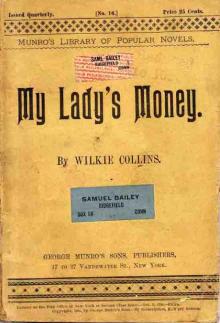 My Lady's Money
My Lady's Money Classic Ghost Stories
Classic Ghost Stories Jezebel's Daughter
Jezebel's Daughter The Devil's Spectacles
The Devil's Spectacles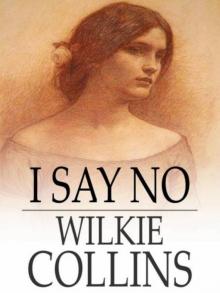 I Say No
I Say No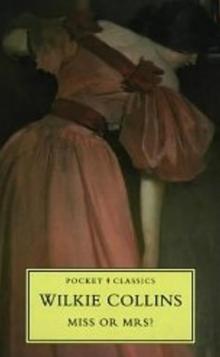 Miss or Mrs.?
Miss or Mrs.?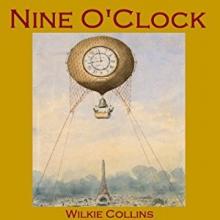 Nine O'Clock
Nine O'Clock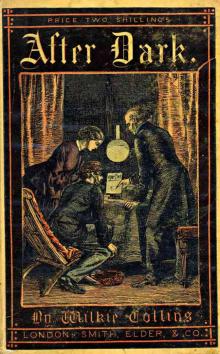 The Lawyer's Story of a Stolen Letter
The Lawyer's Story of a Stolen Letter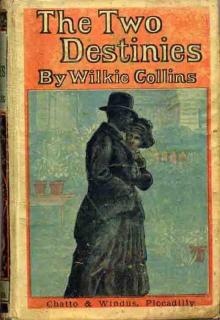 The Two Destinies
The Two Destinies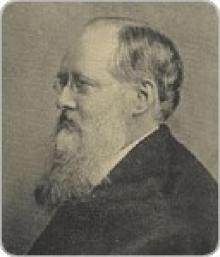 Mr. Percy and the Prophet
Mr. Percy and the Prophet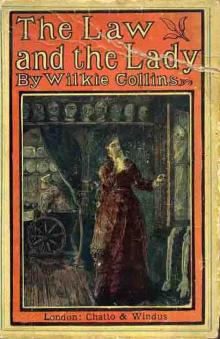 The Law and the Lady
The Law and the Lady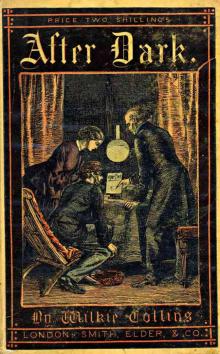 The Nun's Story of Gabriel's Marriage
The Nun's Story of Gabriel's Marriage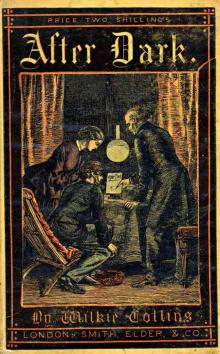 After Dark
After Dark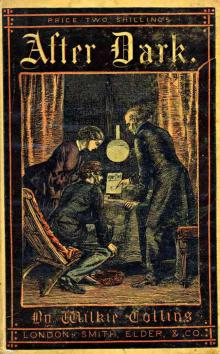 Mr. Captain and the Nymph
Mr. Captain and the Nymph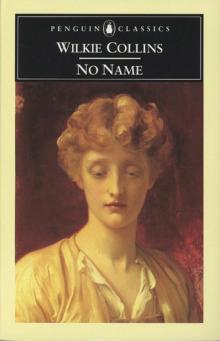 No Name
No Name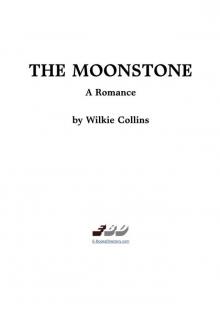 The Moonstone (Penguin Classics)
The Moonstone (Penguin Classics) Antonina
Antonina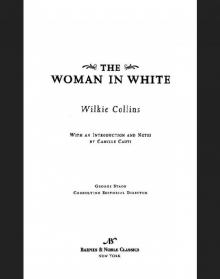 Woman in White (Barnes & Noble Classics Series)
Woman in White (Barnes & Noble Classics Series)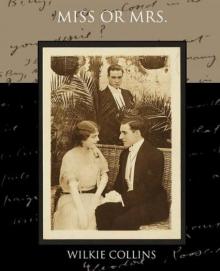 Miss or Mrs
Miss or Mrs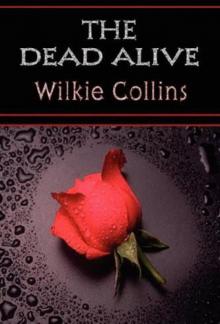 The Dead Alive
The Dead Alive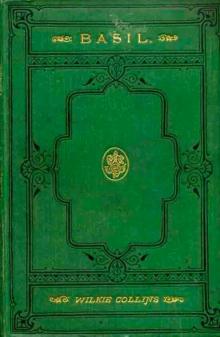 Basil
Basil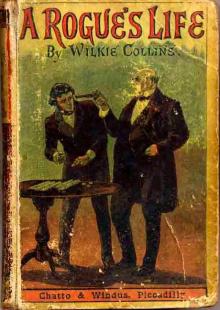 A Rogue's Life
A Rogue's Life The New Magdalen
The New Magdalen Blind Love
Blind Love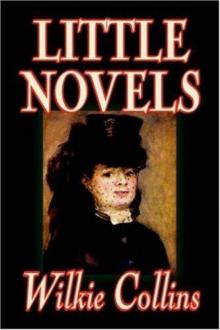 Little Novels
Little Novels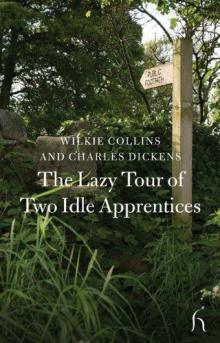 The Lazy Tour of Two Idle Apprentices
The Lazy Tour of Two Idle Apprentices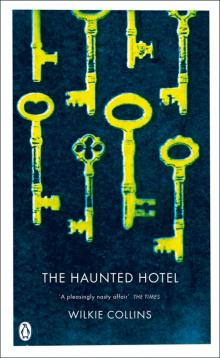 The Haunted Hotel
The Haunted Hotel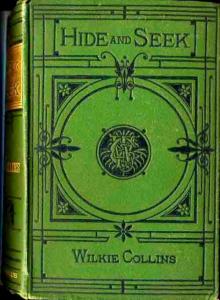 Hide and Seek
Hide and Seek